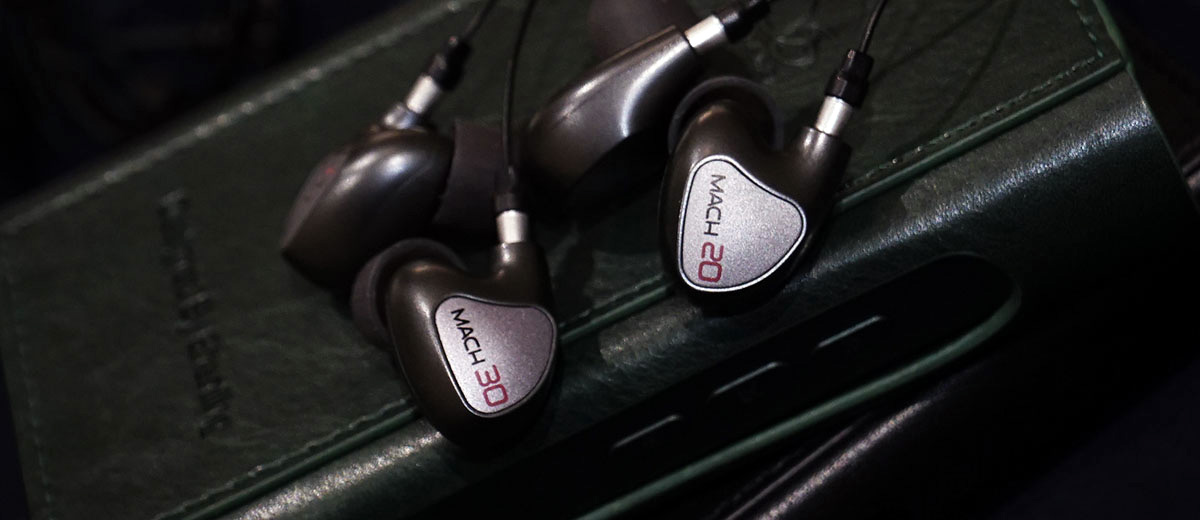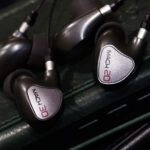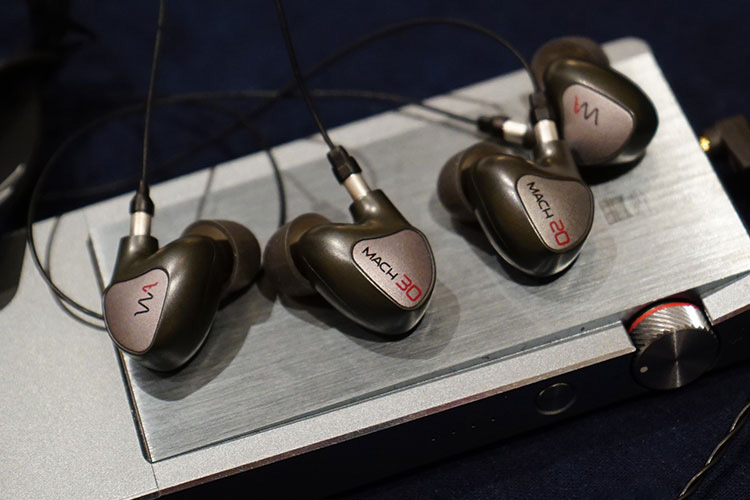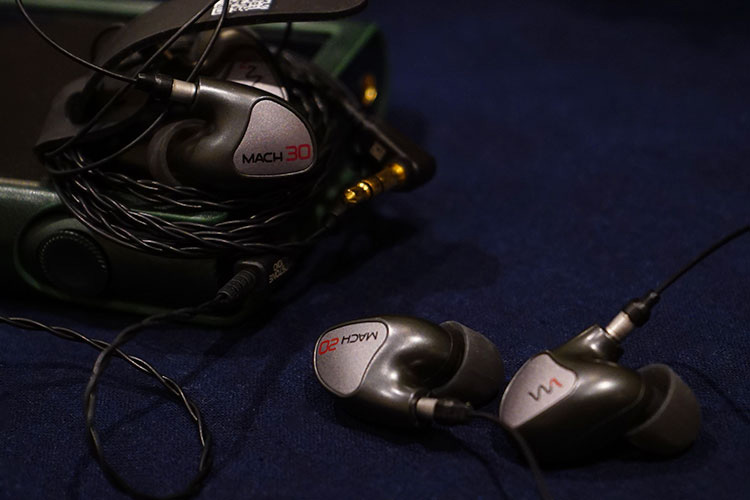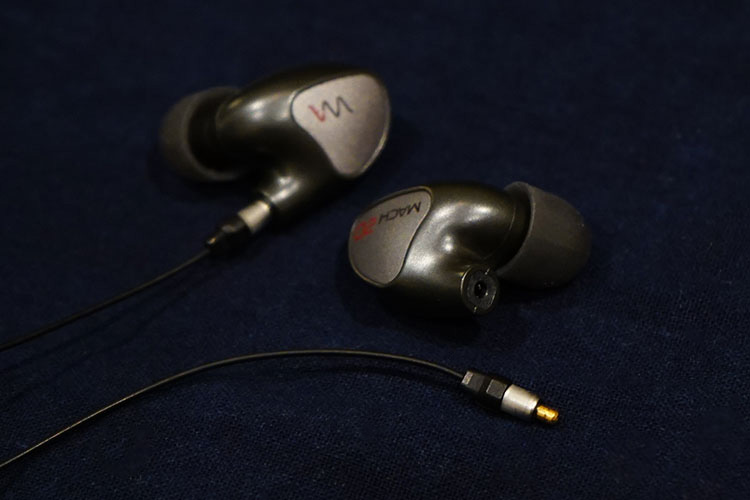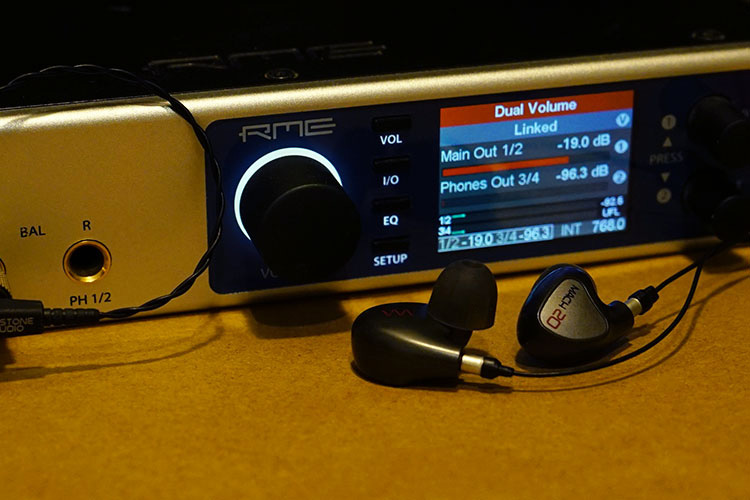This is a review of the Westone Audio MACH 30 & MACH 20 which are universal IEMs using a triple BA and a double BA driver implementation. They are priced at £499 and £399 respectively.
Disclaimer: This is a sample sent in exchange for our honest opinion. Headfonics is an independent website that does not have any affiliate links. We thank both HiFi Headphones UK and Westone Audio for their support.
You can click here to learn more about Westone Audio IEMs we have previously covered on Headfonics.
Note, that this article follows our latest scoring guidance which you can read here.
In the last chapter of our MACH Series reviews we are checking out the MACH 20 and 30 earphones of a different product proposition.
These two models again, share the design of the MACH 80 and every model down the line and are designed not only for music appreciation but professional use as well, yet they are much more affordable at just £399 and £499.
The aesthetics of these earphones are hard to beat but how about the sound performance? Time to give them a spin!
Tech Highlights
The MACH 20 houses 2 balanced armatures with a proprietary, 2-way crossover design, of which 1 driver handles the bass and the other takes care of the mids and treble. The MACH 30 with one more driver under the hood splits the load and lets the lows/mids/treble be handled by a dedicated driver.
What makes the two IEMs special is that the MACH 20 and MACH 30’s impedance rating is at 96Ω @1kHz and 91Ω @1kHz respectively, tripling the numbers on the higher-end models up the line.
Both IEMs are rated 110dB @1kHz when it comes to sensitivity, so there would still be sufficient loudness. Such configuration could help suppress unwanted sibilance when connected to wireless receivers and other noisy sources.
The other parts are similar to the other models within the MACH series, where the T2 connector system is utilized to slim down the profile.
This time the MACH 20 and MACH 30 come with a Linum Estron SuperBaX stock cable that is much tougher and sleeker than the previous gen’s stock cables and has a smaller gauge compared to the SuperBaX on the higher-end model.
Design
The futuristic design on the MACH 20 and MACH 30 are consistent with MACH 40, and 50, right up to the top Westone MACH 80. That means they are all extremely sleek and comfortable, with a scratch-resistant finish with a metallic faceplate adorning the front side.
If you are curious, polycarbonate is used to craft the housing which makes it extremely lightweight yet solid in build quality, allowing prolonged listening without causing pain on the outer ear. The thin stock cable aligns well with the design and feels professional, ready for abuse, and to be worn over the back of the neck.
Comfort & Isolation
The slim housing design and rounded aesthetics achieve great comfort over prolonged listening, while the slightly tilted extrusion angle of the nozzle allows the MACH 20 and MACH 30 to be fitted instantly without any need to be adjusted even after listening for hours.
The thin, weightless cable can be routed behind the neck, the same way how some musicians do to keep them hidden from plain sight. On another note, the over-ear design and lightweight cabling reduce microphonics to a negligible level, even without tightening up the sliders.
Tips
With the lavish sets of foams and tips supplied, especially the high-density foams, the fitting and seal are awesome and allow tiny details to still be heard even in a noisy environment.
As you may recall from our other MACH series impressions, the tips are more elongated than common tips and this enhances not only the comfort by spreading the weight of the earphones more evenly but isolation and bass delivery as well since the seal is fairly tight.
Together in the box, there are 5 pairs of silicone flanges and 5 pairs of Westone Audio’s True-fit foams, including different sizes for different ears.
Again, the foam tips yield the best isolation and it feels pretty close to some custom monitors, and the bass is more prominent than when using the silicone flanges.
Stock Cable
Seldom would the stock cable be one of the highlights for the design, and the Linum Estron SPC SuperBaX cables that come with these IEMs are checking this box as they are super tough and slim, while not hindering the sound performance.
This is probably the coolest and stealthiest “stock black cable” in the market that would fit those who wear glasses/sunglasses as well as professional users. While the cable is quite slim in design it doesn’t get tangled easily and there is no memory effect.
Another merit of the design is the slider with an easy locking mechanism that can be operated by one hand and could help suppress microphonics when tightened, so you can jump on stage or jog with these IEMs without fearing the earphones to drop out of the ears.
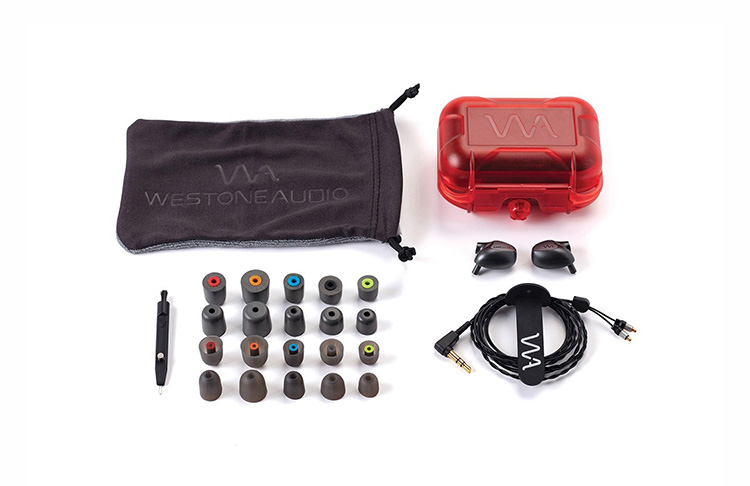
Packaging & Accessories
The newer generation Westone Audio products all come with compact and modern packaging designs, more on the clean and futuristic side than the exaggerated packaging with the previous series.
Inside you will find the 10 sets of tips as mentioned in the above section, and an Impact Resistant carrying case. The other content in the box also includes a set of cleaner tools and a cable binder, plus an additional cloth bag as an alternative storage option.
Sound Impressions
Summary
The MACH 20 and MACH 30 are something different from all other MACH series IEMs we have covered not just by the way they sound, but also by the way they respond to power as they have a rather reference-styled spec proposition.
I was intrigued looking at the high impedance rating, turns out both IEMs sound quite clean and with adequate dynamic even on my MacBook’s phone output and the tuning feels consistent when switching between sources, which is more reliable for professional use.
On another note, the higher impedance also helps bring background hissing to a minimum level.
As you might have guessed, a stronger voltage swing and higher gain will unleash more excitement for both, especially the MACH 30 which tilts slightly more to the low end.
The MACH 20 on the other hand, is more focused on the vocal range and has a slightly fatter vocal image that colors it more intimate and forward with vocals.
Westone MACH 20
The MACH 20 with two drivers has been tuned to sound rounded, forwarded, and sweetened with male vocalists. I would classify it as an M-shaped tuning that pushes the bass and upper vocal frequencies for clarity.
Yet when you give it more power it would sound more responsive and balanced, giving lighter voices more penetration power at the same time.
I suspect there is a large-size balanced armature inside that gives the bass plenty of punch. There is adequate separation power, and the bass doesn’t blend over darker voices.
There is enough resolution that helps define every instrument clearly when replaying a quartet or a small band but may start to get congested with bigger ensembles.
Treble on the MACH 20 is smoothly rounded with quite a sharp roll-off, and the tuning retains just enough energy for some harmonics and dental consonants to cut through. The treble remains well in control even at higher volume and when fed with higher gain and power.
Westone MACH 30
The MACH 30 similarly responds to power. However, compared to the MACH 20’s lukewarm, mid-centric tuning, the MACH 30 feels more open and neutral across the midrange.
Testing with R&B and some moody bass synth tracks, the MACH 30 is capable of defining the lower strings in the bass guitar clearly and densely, with good capability in delivering fast attacks and recovering promptly with a cleaner decay over its powerful bass kicks.
The bass is smoothly articulated to the vocal range, which is also slightly forwarded and clearly imaged. The vocalist has a good presence but isn’t aggressive, and is well-controlled with powerful, hoarse, and shouty voices.
The mid-treble range on the MACH 30 is slightly elevated to bring up clarity and beyond that, you can feel a roll-off that kills all unwanted sibilance and at the same time, colors the vocal range sweeter.
Sharper voices and higher-pitched instruments are presented in a relaxed manner, without covering the other elements running beneath.
Overall, the stronger colorings and fuller vocal body on MACH 20 favor vocals more, and MACH 30 reveals the bigger picture by enhancing tonal balance and defining every instrument more precisely.
Staging & Dynamics
The staging on the MACH 20 is not exaggerated and you can feel instruments spaced and positioned naturally from each other, it feels like listening in a small classroom where every element is intimate and the room feels treated to handle the high bass intensity.
The MACH 30 has enhanced resolution to the MACH 20 defines the treble clearer and brings in more air and naturalness. Being quite high in impedance both IEMs would need more power to sound responsive and I enjoy turning on a higher gain that could further enhance resolution within the perceived stage.
The MACH 30 enjoys a bigger leap in bass quality when powered sufficiently, and the MACH 20 sounds more balanced and controlled when being fed higher power.
When putting the MACH30 on the ADI-2 PRO instruments feels accurately positioned and the vocal image is more dense and powerful. MACH 20 also sounds firmer and defined when given higher power, also the bass is more tamed which helps render the overall output more neutral.
Some professional monitors may sound too flattened or lean towards the treble, but both MACH 20 and MACH 30 manage to deliver good control, dynamic bass, and strengthened transients in the treble that colors the output neutral yet full and airy, especially in the low end.
Click on page 2 below for pairings and our select comparisons.

